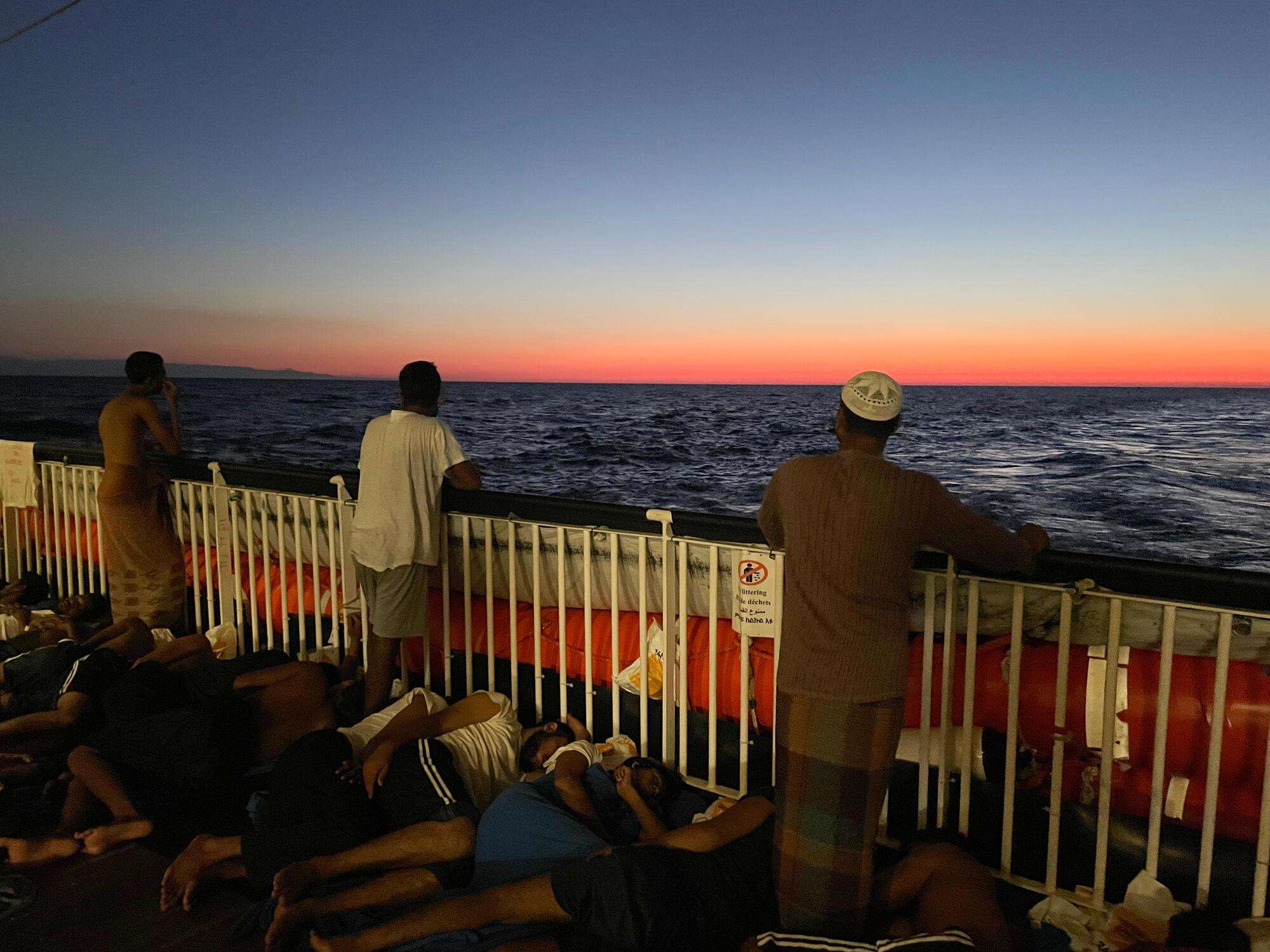CENTRAL MEDITERRANEAN/NEW YORK, AUGUST 3, 2022—The international medical humanitarian organization Doctors Without Borders/Médecins Sans Frontières (MSF), SOS MEDITERRANEE, and Sea-Watch call on European governments to urgently launch state-led search and rescue operations in the central Mediterranean to prevent more deaths at sea. The three nongovernmental organizations (NGOs) run the largest search and rescue operations in the central Mediterranean and have rescued thousands of people who risked their lives to flee Libya and seek safety in Europe.
Recently, across five days, more than 1,000 people on 16 boats were rescued by MSF’s team on the Geo Barents, and the Ocean Viking—a search and rescue ship chartered by SOS MEDITERRANEE in partnership with the International Federation of Red Cross and Red Crescent Societies (IFRC). The week prior, the Sea-Watch 3 rescued 444 people from five boats in distress. Without the presence of NGO search and rescue vessels in the central Mediterranean, people would most likely perish in international waters off the coast of Libya—already the world’s deadliest sea migration route.
But more assistance is needed, the organizations said. MSF currently has hundreds of people on board as they wait to be assigned a place of safety—unable to conduct any more rescues until the current survivors disembark. European states’ disengagement from search and rescue operations in the central Mediterranean combined with delays in assigning a place of safety for disembarkation have severely reduced the capacity of the search and rescue system to save lives. As of the afternoon of August 3, MSF has placed 12 requests for a place of safety—three to Malta and nine to Italy.
“Due to the state of necessity, we currently have 659 people on board of the Geo Barents, which is above the vessel capacity,” said Juan Matias Gil, MSF search and rescue representative. “We kept receiving alerts that were left unanswered or spotting boats in distress from our bridge and it is our legal and moral duty not to let these people drown. [Filling] the void of the state-led search and rescue fleet is simply not enough given the needs. Increasing [search and rescue] capacity in the Central Mediterranean is [essential].”
The Sea-Watch 3 disembarked 438 people in Taranto, Italy on July 30, and the Ocean Viking disembarked 387 people rescued on July 24 and 25 in Salerno, Italy on August 1. Meanwhile, the MSF is still waiting for a solution to be found for the survivors on board the Geo Barents—some of whom were rescued seven days ago.
“Keeping survivors stranded at sea for days waiting to disembark in a place of safety is additional violence imposed on already extremely vulnerable people,” said Xavier Lauth, SOS MEDITERRANEE director of operations. “Survivors rescued by the Ocean Viking in the past six years have been recounting harrowing stories of violence and abuse to our teams. The last and only hope they carry is to manage to flee Libya, which they often call ‘hell on earth’, via the sea, regardless of the risks. The removal of adequate and competent European search and rescue services in international waters off [the coast of] Libya has proven to be deadly and ineffective in preventing dangerous crossings.”
“While the European authorities are not willing to fulfill their duty to rescue people at sea, they are also delaying the disembarkation of rescued people by NGOs,” says Mattea Weihe, SEA-WATCH spokesperson. “This unnecessary waiting for days exhausts the rescued people: They have survived the Mediterranean, but instead of finding safety, they have to wait for days at the closed gates of Europe for their human rights to be respected.”
When MSF seeks coordination for rescue operations (as required by maritime law), Libyan maritime authorities rarely respond, neglecting their legal obligation to coordinate assistance. And when they do intervene, they intercept boats in distress and forcibly return the survivors to Libya—which the United Nations does not consider a place of safety under international law.
Despite the critical lack of adequate search and rescue capacity in the central Mediterranean, people continue to flee Libya via this deadly route, risking their lives to seek safety. During summer, when weather conditions improve, departures from Libya increase and more search and rescue capacity is required.
MSF, SOS MEDITERRANEE, and SEA-WATCH demand that European Union member and associated states provide an adequate, proactive state-led search and rescue fleet in the Central Mediterranean, a fast response to all distress calls, and a swift disembarkation mechanism for survivors.
MSF has run search and rescue activities in the central Mediterranean Sea since 2015, working on eight different search and rescue vessels independently and in partnership with other NGOs, including Sea-Watch and SOS MEDITERRANEE. Since 2015 MSF’s teams have provided lifesaving assistance to more than 80,000 people in distress at sea. MSF relaunched search and rescue activities in the central Mediterranean in May 2021, chartering its own ship, the Geo Barents, to save lives, provide emergency medical care to rescued people, and bear witness from the world’s deadliest sea border.
SOS MEDITERRANEE is a European humanitarian and maritime search and rescue organization operating in the central Mediterranean Sea. It was founded by civilians in May 2015 in response to deaths in the Mediterranean Sea, and the failure of the European Union to prevent these deaths. From February 2016 to December 2018, SOS MEDITERRANEE chartered and operated the rescue ship Aquarius. Since August 2019, SOS MEDITERRANEE charters and operates the Ocean Viking. Since the launch of operation, they have rescued and assisted more than 36,000 people in distress at sea.
SEA-WATCH is a civil NGO which has conducted search and rescue operations in the Central Mediterranean Sea for more than six years. Sea-watch also documents human rights violations and reports people in distress using civil reconnaissance airplanes.




